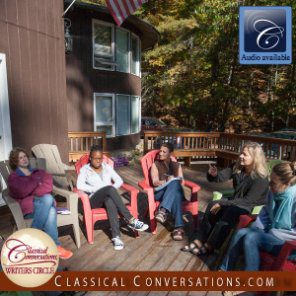Classical Conversations stresses parent involvement. In fact, parents are supposed to be the primary teachers. And for the most part, parents are the primary teachers. Taking on that role is never easy, but it is probably easier to do when the children are young. It is much easier to be involved when the material is easy, when the material is something with which you are at least vaguely familiar. Foundations memorization is a tall order, but you listen to the CDs along with your students and learn right along with them. Learning the material is not necessarily effortless, but it does not seem daunting enough to scare you away. And once you have learned the material alongside your child, you realize it was unquestionably worth it (remember this point!).
Then Challenge hits. Challenge A, you begin to realize, is like Foundations on steroids. Ugh! But, you persevere and struggle with your student, learning geography, Latin, math, and so on. However, it is generally during this year that a strange phenomenon begins to occur.
Yes, parents are the primary teachers, at least in theory. Having taught Challenges B through IV over the past six years, I have noticed this phenomenal trend, a trend that intensifies throughout the Challenge program. Despite the CC stance that the Challenge program is a “drop off, not drop out” program, parents slowly, but surely, tend to begin dropping out. I understand this. The material gets tougher and tougher, more and more daunting, perhaps even enough to scare you away. Add to this the reality that your student (hopefully) is becoming more and more autonomous in his learning. Couple these conditions with the fact that you have two or three little ones in Foundations who need your time, and you get the perfect storm. This perfect storm coaxes and convinces many parents to embark on a nearly imperceptible march toward disengagement. Slow and unnoticeable, but real.
You might be travelling down the road to “Drop Out” parent status if…
- …you approach your Challenge director at the end of the semester and tell him your child does not understand a concept supposedly mastered during Week 2.
- …you take ten weeks to notice a question asked of you in the Challenge director’s weekly email to you.
- …you do not understand how to decline a Latin noun or conjugate a Latin verb.
- …you are unaware that your student did poorly on a chemistry test.
- …you consistently excuse your child from his homework because you realize the morning of class that he has not done it.
- …you are unaware that your child has not mastered multiplication tables.
- …and so on.
Am I advocating that Challenge parents learn every single thing that the Challenge student learns? No. As stated, they should be developing into relatively autonomous learners, learning how to learn. However, you should at least learn some things alongside them and at least be familiar with other things.
Classical Conversations is all about the conversation; the crux of the learning occurs during the conversations. Mastering the material and learning to love learning solidifies into real knowledge, understanding, and wisdom when the students engage in meaningful discussion. If these discussions only occur one day a week in class, then I daresay the point of CC is being missed.
Here are some suggestions to help you stay involved. Stay on top of Latin and math. In my opinion, these two subjects are the most difficult in which to demonstrate mastery and are perhaps the two subjects in which your child will need the most help. In your Challenge Guide (under the heading “CC Difference #7”), we are reminded that “By mastering the grammar, deepening the dialectic skills, and integrating universal ideas and themes, students experience a deeper, more connected, Christ-centered education.” In a conversation I had with Leigh Bortins, she stressed that some of the most important goals for each individual subject are “to develop a love of learning and to demonstrate mastery.”
Other ideas which encourage remaining engaged might be to read the literature books or at least read the Sparknotes for those books. Read through the chapter in logic and, at a minimum, be familiar with the terms. Spend five minutes Googling the philosophers they are studying. Look up a specific event in history that corresponds to what they are studying. Learn an unusual fact about DNA. With a small amount of effort, you can develop a peripheral knowledge of what they are studying in depth.
Most importantly, sit and chat with them! Ask them what they are learning. Or, better yet, be ready with some basic questions of your own on the topics they are studying. What is a Truth Table (Logic)? What event leading up to the Civil War do you think had the most impact on Lincoln’s decision to go to war (American History)? Why do you think Nietzsche was so caustic toward Christianity (Philosophy)? How does homology support creation (versus Evolution)? Asking leading questions will draw the student into conversation. And when a student practices explaining a point to you, he practices rhetorical thinking. Docēndo Discimus (by teaching, we learn). These ideas, along with the conversations you have with your student, will enable, enrich, and enhance his education beyond measure. The added benefit is that you just might learn something along the way!
Easy? No.
Time consuming? Absolutely.
Worth it? Unquestionably!




